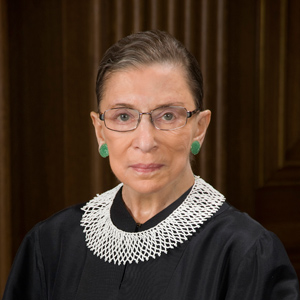Ginsburg says Kennedy's retirement was 'event of greatest consequence' for current term

U.S. Supreme Court Justice Ruth Bader Ginsburg. Supreme Court official portrait.
U.S. Supreme Court Justice Ruth Bader Ginsburg appeared to suggest Friday that the number of sharply divided cases will increase as the term ends, beating the current percentage of about 25%. And she also appeared to suggest that the retirement of Justice Anthony M. Kennedy is affecting the outcomes.
Ginsburg noted that the Supreme Court so far had issued 43 decisions in argued cases, and 27 were yet to be announced. Out of those 43 decisions, only 11 were decided by a 5-4 or 5-3 vote, Ginsburg said in prepared remarks for a judicial conference for the 2nd U.S. Circuit Court of Appeals at New York.
“Given the number of most-watched cases still unannounced, I cannot predict that the relatively low sharp-divisions ratio will hold,” Ginsburg said. Bloomberg, the Washington Post and the Associated Press have coverage; How Appealing links to additional coverage.
Ginsburg said the retirement of Kennedy has had an impact. Ginsburg said it was “the event of greatest consequence for the current term and perhaps for many terms ahead.”
Ginsburg discussed specific cases pending before the court without specifically addressing the outcome. But court watchers nonetheless may be reading meaning into her remarks.
In cases that ask the court to consider the constitutionality of electoral maps drawn to favor Republicans or Democrats, Ginsburg said: “However one comes out on the legal issues, partisan gerrymandering unsettles the fundamental premise that people elect their representatives, not vice versa.” The partisan gerrymandering cases are Lamone v. Benisek and Rucho v. Common Cause.
Ginsburg called another case, Department of Commerce v. New York, a case “of huge importance.” At issue is whether the Commerce Department can add a citizenship question to the 2020 census.
Commerce Secretary Wilbur Ross said he decided to add the question in response to a Justice Department request for citizenship data to aid in enforcement of the Voting Rights Act. But evidence in the case suggests that Ross sought to include the question long before the Justice Department’s request, Ginsburg said.
“Speculators about the outcome note that last year, in Trump v. Hawaii, the court upheld the so-called ‘travel ban,’ in an opinion granting great deference to the executive,” Ginsburg said.
“Respondents in the census case have argued that a ruling in Secretary Ross’ favor would stretch deference beyond the breaking point.”
Ginsburg also discussed Manhattan Community Access Corp. v. Halleck, which asks whether a private nonprofit corporation that operates a public-access TV channel is a state actor that can be sued by two producers for an alleged First Amendment violation.
Ginsburg wrote: “As you know, the state-action doctrine is not a crystal-clear area of the law; it has had its ups and downs. Do not anticipate a decision that will dispel further controversies over what qualifies as state action.”
Turning to another topic, Ginsburg noted that Justice Brett M. Kavanaugh hired four law clerks who are all women. As a result of his hiring decision, the Supreme Court for the first time has more women than men as law clerks, Ginsburg said.
“Women did not fare nearly as well as advocates,” Ginsburg added. “Only about 21% of the attorneys presenting oral argument this term were female; of the 34 attorneys who appeared more than once, only six were women.”



